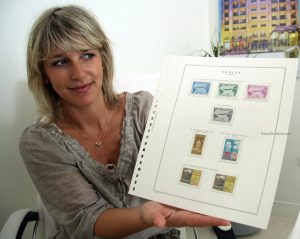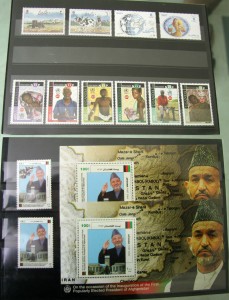 Christiane A. Weber is an artist who passionately believes that philately is an art that has much to offer even in the modern digital age. She will exhibit some of her rare stamps at Coral Beach Resort – Sharjah from June 15 to 25 focusing on the birth and growth of the Italian Republic from 1946 onwards. A significant part of the collection will offer a glimpse of the first 40 years when the country went through major changes to emerge as a nation.
Christiane A. Weber is an artist who passionately believes that philately is an art that has much to offer even in the modern digital age. She will exhibit some of her rare stamps at Coral Beach Resort – Sharjah from June 15 to 25 focusing on the birth and growth of the Italian Republic from 1946 onwards. A significant part of the collection will offer a glimpse of the first 40 years when the country went through major changes to emerge as a nation.
Christiane who began to delve into philately and specifically stamp production in 2002, is one of the few women who has created a space for herself and her company in this rather challenging field. She has been commissioned to work for several organizations and governments, but is insistent that her contracts offer the scope to pursue the cherished goal of helping charitable causes in developing nations.
“A stamp is a unit of currency and producing one requires commitment and responsibility. But above everything else this little piece of paper tells a compelling story. The stamp has gone through three centuries of history by becoming the world’s most widespread “monument”, thanks to which every nation can create a lasting tribute to the events, characters or social achievements made or people being celebrated by several countries at once.”
 She speaks here about her unique art.
She speaks here about her unique art.
Q.: What would you like to achieve with this exhibition?
I would like to give people the possibility to travel in time… to see the stamp as a global messenger and last but not least to see what social achievements can be made through the sale of a commemorative stamp issue in the sector sports / health /education. Also, I would like to revive the interest of stamps and stamp collecting in coordination with the Emirates Philatelic Association who have kindly supported my efforts.
Q.: When did you begin your journey into the world of stamps?
It all began with my work as investigative journalist with Filmalpha S.r.l, Rome, Italy, producing documentaries and films. The company was producing a documentary on the Pope’s visit to Cuba. I was also involved with creating coins and stamps for the occasion, when my interest and passion in this unique art was aroused. I learnt all I could about stamps and stamp making before venturing out on my own in 2002.
Q.: Are you commissioned by governments to create stamps?
The stamp is a currency commissioned by the Ministry of Communications. During my stint with Global Philatelie GmbH Barcelona Branch, I handled project management on behalf of Ministry of Communication and Ministry of Health in countries like Afghanistan, Benin, Cambodia, Somalia, Togo, Ivory Coast, Chad and RASD- Sahrawi Arab Democratic Republic; advising them on all aspects from licensing the philatelic product through to creating Channels on the wholesale and retail market up to production and marketing.
My first individual project was with the government of Afghanistan and the World Health Organisation, Kabul, Afghanistan, since the project fulfilled the basic criteria of using stamps to create awareness and support charity. I coordinated and created the stamp for the first democratic presidential election of the country. The images, which were very well-received globally, portrayed a positive and hopeful image of a country ravaged by war and invasions.
Q.: Do you plan to undertake any projects in the UAE?
I am currently in talks with the Emirates Football Association to create a collectible series on the game, which is a passion for many in the country. I have already visited some of the key clubs in the Emirates and hope to soon get a go ahead from the Emirates Postal Authority.
Q.: Do you create collectibles as well?
Yes, there is a big market for collectible stamp series as well as special flyers with commemorative stamps. Specifically relating to football I have already done a series for Juventus and AC Milan. There is also an ongoing series on the beatification of Pope John Paul II, which will be sold at selected souvenir stores in Italy. Needless to say a percentage of all sales is used to support charitable projects.
Q.: There are very few women who would choose stamp making so what were the challenges you faced?
It is primarily a man’s domain. A woman has to work twice as hard to be successful. But – I am a fighter and I follow my vision. In matters of principles I stand like a rock. When I started my company in 2002… I had to learn everything regarding the production. I even decided to work on some of the machines in order to understand all the different steps of production. It is very important to get the process right from the drawing, to the colors, perforation etc. Any mistake means that the entire batch has to be destroyed.
Q.: What about stamps that carry mistakes and are in circulation?
Well, they become collectors’ items and sell at high prices at auctions like the Gronchi Rosa stamp shown at the exhibition! Of course, there are deliberate errors or fraudulent stamps created by those who look to benefit. For example, they might use the image of a Hollywood icon on the stamp of an African nation, which has no correlation to the star nor being authorized by the issuing authority. But, the Universal Postal Union (UPU), with its headquarters in Berne, Switzerland, is the monitoring body for such fakes.
Q.: Can you provide some details of your charity work?
Charity is bedrock of all my ventures. The children are our future. And wherever there is a possibility to combine a commemorative stamp issue with a humanitarian project – then I go for it. I must travel to the countries I am dealing with… to visit the projects I am talking about. One time there was no more flights to Kabul, where I had to be for the Word Health Day. So I decided to go by taxi from Peshawar to Kabul… passing the Torkham border and travelling through the tribal area. It was a unique experience.
Some of Christiane’s charity projects
- A stamp for Badakshan, Afghanistan
- Fundraising project on behalf of WHO Afghanistan. Funds were used for the construction of a shelter home for TB (Tuberculosis) infected patients, mainly women, in the province of Badakshan, Afghanistan.
- World Health Day 2005 – Mother & Child, Uganda
- Non-profit project on behalf of WHO Uganda, to educate and increase public awareness about TB, Leprosy and HIV. A percentage of generated funds were used to train health care workers in rural areas.
- Microwater Business Project in Kolkata, India – Arsenic removal processes in West Bengal.
- In co-operation with SWISS WATER TECHNICS, Aarau, Switzerland and
- German Doctor’s / Howrah South Point – Howrah, West Bengal, India
For more information visit www.coral-beachresortsharjah.com



































